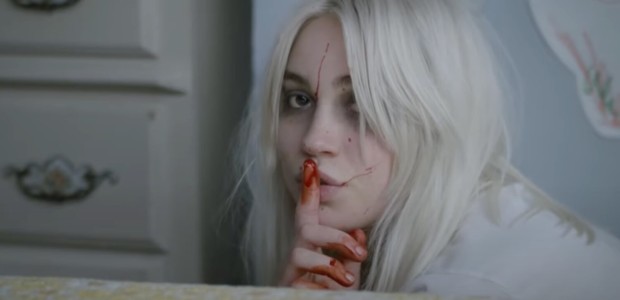While trauma is a basic tenet of the horror genre as a whole, the purest expression of it within the genre has got to be the ghost. Psychologically, trauma is something that follows an individual throughout their lives, so the ghost is the eternal spiritual manifestation of that, a trauma so great that it transcends death. Most classic ghost stories involve an element of revenge as a result, yet that revenge is often framed as a righteous search for justice. DOUBLE WALKER, a new film from co-writer/director/cinematographer Colin West and co-writer/producer/star Sylvie Mix, takes a less common view: a ghost revenge tale involves perpetuating a cycle of trauma rather than succinctly ending it. That perspective is an indication of how thoughtful the film is, and while it has too much on its mind to be easily accessible or straightforward, DOUBLE WALKER’s elliptical narrative makes for a compellingly poetic experience.
Beginning with a series of images that builds a backstory shot-by-shot (a stylistic quirk that continues throughout the film), DOUBLE WALKER soon introduces its protagonist, Ghost (Mix), as a young woman clad in nothing but a long white t-shirt wandering around the snowy Ohio woods. She’s taken in by a man, Brian (Justin Rose), who is gentlemanly at first, but his furtive glances at the girl’s body are soon quite noticeable. The Ghost seduces him, making him let his guard down before slitting his throat and reveling in the bloody mess. This is far from a random kill, however—it becomes clear that Brian was a “sinner,” in the Ghost’s words, one of two types of people who can perceive her (he also has a tangential involvement with the Ghost’s death when she was human, to boot). She meets the other type, a “believer,” in Jack (Jacob Rice), a meek small town movie theatre owner who is genuinely kind to her, resulting in the couple tentatively beginning a courtship. Unfortunately, the Ghost’s mission of vengeance will prove detrimental to their relationship as more is revealed about the Ghost’s past and her ability to affect the real world.
If that broad synopsis sounds familiar, it’s probably because the movie’s plot hews close to 2020’s PROMISING YOUNG WOMAN. That film, amongst other things, muddles its messages and flirts with genre tropes while never committing to them. DOUBLE WALKER, on the other hand, is much clearer and cleaner. West and Mix embrace the genre, the filmmakers unafraid to get bloody and stage some creepy setpieces while making their film more esoteric than usual. The film is among the best of the “elevated horror” subgenre because it doesn’t position itself as superior, just honest and heartfelt. In its stream-of-consciousness editing (by Keara Burton), cool-toned cinematography (by West) and grounded, low-key performances, it joins the ranks of recent works like STARFISH (2019) and SHE DIES TOMORROW (2020) in stretching the horror genre artistically while honoring its roots.
As it is a typical pitfall for artsier movies, DOUBLE WALKER’s esotericism may go too far for some. West and Mix hold back many details regarding Ghost’s past until the very end, and while this makes its eventual reveal that much more impactful, it can feel like the movie is spinning its wheels until then. The film’s new take on the tropes regarding ghosts isn’t ever fully explained—Ghost, in some bits of narration, pseudo-explains how she got to be a ghost, who can see her and can’t, and so on. Yet the film never sets any firm boundaries, and as a result it’s not clear if the climax of the movie is a hallucination, a vision, an alternate reality or a change that Ghost herself has caused. The film is better and richer for this ambiguity, however, its presentation of the supernatural based more on emotion than logic or intellect.

The best word to describe DOUBLE WALKER might be “enigmatic,” and that’s thanks to Sylvie Mix’s portrayal of Ghost. Between this film and the upcoming POSER, it’s evident that the up-and-coming Mix has a beguiling blankness to her as an actress, one that so far she is using to great effect. Sure, Ghost’s pallid complexion and all-white wardrobe evoke her ethereal status, but it’s Mix’s searching eyes, blank slate expression and compelling monotone that makes a character out of what could’ve been a mere archetype, as the name “Ghost” suggests. Through her, DOUBLE WALKER becomes a feminist revenge thriller, a study of trauma being passed on through families and the people they love, and a supernatural fantasy about a girl taking control of her own narrative.
The film embraces all these facets that the ghost story can contain, taking a distinctive indie art-horror approach that evokes classic genre-adjacent surrealist films about the afterlife like Alejandro Jodorowsky’s EL TOPO (1970) and Jim Jarmusch’s DEAD MAN (1995). The movie isn’t flashy, but it’s clear by watching it how much of a passion project it was for West and Mix. During a moment where Jack explains to Ghost how memories and old home movies of his family act like “a good haunting,” Ghost perks up, smiling shyly to herself. DOUBLE WALKER isn’t just a film about trauma, but one that explores and acknowledges the myriad ways people can be haunted, not all of them bad. If met halfway, DOUBLE WALKER makes for a pretty damn good haunting.
Tags: Colin West, Double Walker, Ghost Stories, Ghosts, Jacob Rice, Justin Rose, Keara Burton, Revenge, Sylvie Mix



No Comments